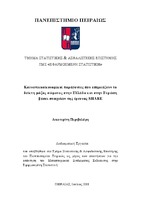Κοινωνικοοικονομικοί παράγοντες που επηρεάζουν το δείκτη μάζας σώματος στην Ελλάδα και στην Ευρώπη βάσει στοιχείων της έρευνας SHARE

Προβολή/
Λέξεις κλειδιά
Δείκτης μάζας σώματος ; Δημογραφικές & οικονομικές παράμετροι ; Δείκτες υγείας ; Πολυωνυμική λογιστική παλινδρόμησηΠερίληψη
Στα πλαίσια της παρούσας εργασίας γίνεται αξιοποίηση στοιχείων από το δεύτερο κύμα της έρευνας SHARE με απώτερο σκοπό τη διερεύνηση της επίδρασης συγκεκριμένων δημογραφικών και οικονομικών χαρακτηριστικών, αλλά και ορισμένων δεικτών υγείας στο δείκτη μάζας σώματος των ατόμων ηλικίας πενήντα ετών και άνω. Αρχικά, παρατίθενται βασικές πληροφορίες για το δείκτη μάζας σώματος (αναδρομή στο παρελθόν και μειονεκτήματα του δείκτη), καθώς επίσης και για το επιδημικό φαινόμενο της παχυσαρκίας, κυρίως όσον αφορά τα άτομα άνω των πενήντα ετών και μεταξύ των χωρών (παράγοντες κινδύνου και προβλήματα υγείας). Στη συνέχεια της εργασίας λαμβάνει χώρα η στατιστική επεξεργασία και ανάλυση των δεδομένων, η οποία διαρθρώνεται σε δύο μέρη. Στο πρώτο μέρος (Κεφάλαια 2 και 3) γίνεται, κατά κύριο λόγο, χρήση των μεθόδων περιγραφικής στατιστικής (πίνακες συχνοτήτων και συνάφειας, γραφήματα, έλεγχοι ανεξαρτησίας, μέτρα συνάφειας), ενώ στο δεύτερο (Κεφάλαιο 4) αναπτύσσονται μοντέλα πολυωνυμικής λογιστικής παλινδρόμησης, ούτως ώστε να εξακριβωθεί ποιοι είναι εκείνοι οι παράγοντες που επηρεάζουν το βάρος και σε ποιο βαθμό. Στο τελευταίο κεφάλαιο γίνεται σύνοψη των κυριότερων συμπερασμάτων που προέκυψαν από την ανάλυση των διαθέσιμων δεδομένων. Ενδεικτικά, σημαντικό εύρημα αποτελεί το γεγονός ότι η συντριπτική πλειονότητα των ατόμων στο δείγμα είναι υπέρβαρα, με το φύλο, τη χώρα διαμονής, αλλά και την οικονομική άνεση να είναι μερικοί μόνο από τους παράγοντες που επιδρούν στη διαμόρφωση του βάρους.


